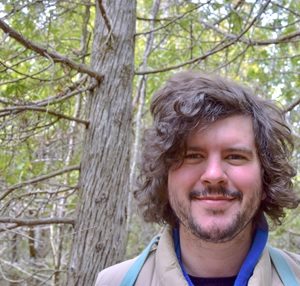
Elan Pochedley
Elan Pochedley is a PhD candidate in the Department of Anthropology at the University of Minnesota-Twin Cities, where he has earned dual graduate minors in American Indian & Indigenous Studies (AIIS) and Heritage Studies & Public History (HSPH). He is an enrolled member of the Citizen Potawatomi Nation.
Elan’s dissertation, “Contemporary Neshnabék Territoriality: A Study of Connections and Obligations to Waters, Lands, and Nonhuman Relatives,” analyzes how obligations to nonhuman relatives, popularly categorized as “natural resources,” are actively practiced by Potawatomi and Ojibwe nations. In this multi-sited ethnography, Elan collaborated and conducted ethnographic research with four sovereign Neshnabék nations: the Citizen Potawatomi Nation, the Match-E-Be-Nash-She-Wish Band of Pottawatomi, the Nottawaseppi Huron Band of the Potawatomi, and the White Earth Nation (Ojibwe).
By studying these nations’ obligations to nonhuman relatives alongside their present-day territorial claims, his dissertation is comprised of relational analyses of environmental ethics across Neshnabék nations, reservations, and homelands typically perceived as isolated from one another. Elan studies how these nations navigate emerging technologies, legal approaches, and U.S.-sponsored ecological restoration projects while maintaining specific ethical commitments. His research investigates Potawatomi and Ojibwe nations’ efforts to restore wild rice, rehabilitate eagles and sturgeon, protect bodies of water, and contest infrastructure projects that threaten the health and livelihoods of their human and nonhuman kin. This ethnographic research was conducted with the consent and approval of these nations’ respective tribal councils and/or research review boards.
As the Research Fellow in Geography and Cartography at the Citizen Potawatomi Nation’s Cultural Heritage Center, he is currently utilizing ArcGIS software to spatially map historic Potawatomi homelands, presences, inter-species relational networks, and place names in Indiana. The resulting maps are the basis for an article he recently authored for the Open Rivers: Rethinking Water, Place & Community journal.
His dissertation research has been supported by the National Science Foundation Graduate Research Fellowship Program (NSF GRFP), the Mellon Foundation, the University of Minnesota Diversity of Views & Experiences (DOVE) Fellowship, and the Beverly & Richard Fink Summer Research Fellowship. He recently accepted the Charles Eastman Fellowship at Dartmouth College, which he will begin in the fall of 2021. In 2016, he received his B.A. in Native/Indigenous Studies (Ethnicity & Race Studies) from Columbia College, Columbia University, where he served as Co-President of the Native American Council and was a recipient of the Mellon Mays Undergraduate Fellowship (MMUF).